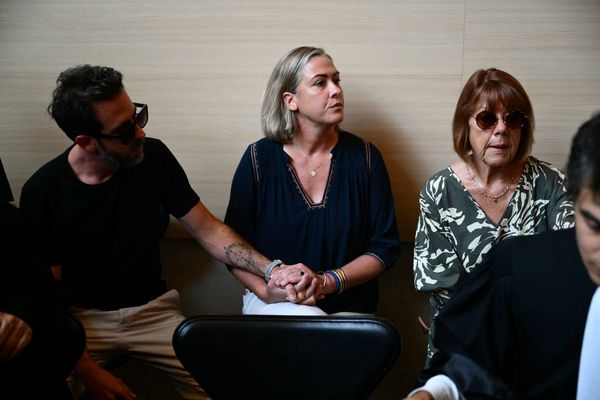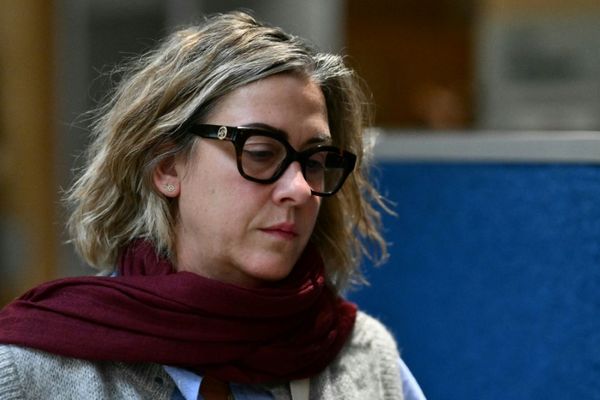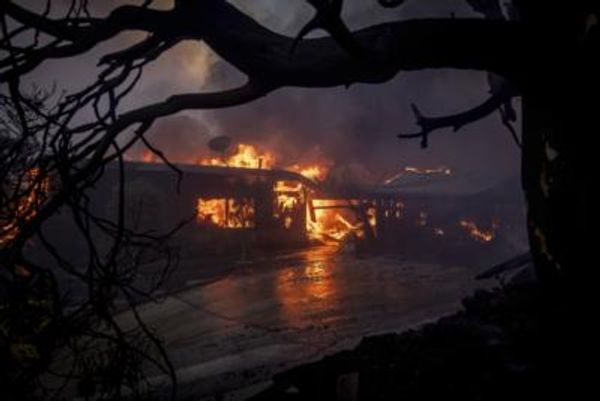As Emma Galbraith sees it, all teen movies are about being in between. Starring as the titular “inbetween girl” in a new independent film shot in Galveston and Austin, Galbraith plays the sarcastic, aimless Angie, a half-Chinese, half-white teenage girl partly drawn from Galbraith’s own experience of growing up biracial in Texas. At 19, Galbraith is an actor as well as a youth organizer for climate and housing justice in Austin.
Inbetween Girl explores Angie’s feeling of inbetweenness in terms of race and ethnicity at her predominantly white Episcopalian high school, but also in her family: After her white mom and Chinese dad get divorced, she feels out of place in both homes. When Angie starts secretly sleeping with school heartthrob Liam — who has a girlfriend, a blonde Instagram influencer named Sheryl — the shame felt by his insistence on keeping it a secret is searing.
Strong acting, nuanced writing, lovely art direction and inventive editing make the film funny, dynamic, and effortlessly sweet, without falling into cliché. Written and directed by Mei Makino, Inbetween Girl won the Audience Award at SXSW and screened most recently at the Austin Asian American Film Festival. It is seeking distribution now. This month, Galbraith sat down with the Observer to talk about teen movies and Texas.
Texas Observer: Tell me about shooting the movie in Galveston and working with the Austin film scene.
Mei Makino grew up in Galveston, so she had a very personal connection to that city. Galveston’s so beautiful, unreasonably beautiful, so it was just so nice to be on set every day. We shot exteriors in Galveston. It was magnificent and it’s such an underratedly cinematic place. All these beautiful bright colors. It’s on this island, which I also think is very symbolic to Angie, because she feels very isolated, just surrounded by this beautiful world that she can’t really make sense of. Shooting in Austin was great, too. There’s this really tight-knit community of people here, a lot of whom know what it’s like to shoot like a passion project on a very low budget.
What’s the significance of rooting this film in local places?
Inbetween Girl is such a Texan film. All the talent was local. There’s an understanding of what it’s like to be raised in Texan culture. Angie’s struggles are very relatable, but I’ll say this: the condition of Asian Americans in Texas is its own thing. It’s specific. I can’t speak for William Magnuson, who plays Liam, but I know in our conversations there was a lot of talk about how the particular breed of toxic masculinity in Texas is its own thing.
What kind of conversations came up between you and Mei about the specific experience of Asian Americans, and being biracial, in Texas?
Being biracial is interesting. When you don’t quite know your roots, you feel like you’re floating. You float in between worlds and there’s a very specific kind of cultural knowledge that comes with feeling grounded. That’s something that I’ve struggled with for a long time being born here and living most of my life here in Austin. When half of your family lives in a different country across the ocean, it’s a very interesting life experience. There’s a philosophy of: biracial people are not half and half, but both. There’s definitely a feeling that Angie doesn’t fit in either half; there’s no room for the Asian side of her in the white space and there’s no room for the white side of her in the Asian space. It makes learning about your culture really hard because these structures were not necessarily built for that balance. The process of figuring out how to live in that has to do with releasing notions of binaries. Release this notion that you have to be confined to one or the other. The world was meant to flow, it was not meant to be honeycombed.
Why do you think coming-of-age movies can speak to issues of race, gender, sexuality, and class so well? What do you say to people who think of teen movies as surface-level?
I think teen movies have always been about being in between. They’re places where the pain, the growing pains, of transition can be expressed. Being a teenager is messy and smelly and awkward and gross and confusing, and unresolved. The more movies that are made that star teenagers, the more people feel seen and understood in a way that’s not superficial. My personal opinion is that the superficial branding of a lot of teen movies is misogyny. But there’s also something to be said about really good writing that is honest about the teen experience and honest about how disgusting it is a lot of the time. Because you’re a bug, and you’re molting. You’re leaving your cocoon, your exoskeleton, and that isn’t pretty.
The writing of female characters in this film bucks the norm of how young female characters are often written or treated. Spoilers here: Angie ends up making friends with Liam’s girlfriend, Sheryl, someone she’d expected to hate. What was the intention there?
I love the Angie-Sheryl friendship. That’s one of my favorite things about the movie. It steps back from the competition aspect, this made up competition between women. It’s not a real thing. There’s a specific point made in Inbetween Girl: What does it actually mean to be a woman supporting another woman? And on top of that, to acknowledge that people make a bunch of mistakes all the time and are flawed but still deserve love. I think the easiest way to do that, which Inbetween Girl did, was just to give the two of them a chance to talk.
You can tell, with how hard Liam tries to keep them from talking, how this narrative serves the man.
It’s almost as if divide and conquer is a very popular strategy for people in power to get other people to do what they want them to do. I’m just saying, I’m just saying (laughs). Honestly, Angie and Sheryl kind of unionize, a little bit, but Sheryl didn’t know.
It was literally as simple as having a relationship with each other. When it comes to organizing it’s so important to have conversations with the people around you. Most of the time people don’t know what power structures they exist in until they just have a conversation. Most of the time it’s gossip with someone they work with or something. Just air out your stuff, because you never know what opportunities there are to take back some power that’s been taken from you.







